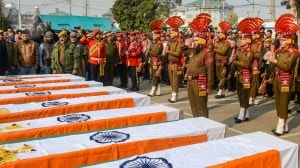Apocalypse now: It’s a mythical war
Writing in the International Herald Tribune, William Pfaff summed up the nature of the international crisis over Iraq. ‘‘The inter...

Writing in the International Herald Tribune, William Pfaff summed up the nature of the international crisis over Iraq. ‘‘The international system rests on the principle of absolute sovereignty of states, which has nothing to do with the merits or morality of governments,’’ he argued.
‘‘By trial and error, this has been found the least bad of international diplomatic and legal systems. The UN is the agent of this system for exercising international authority. The US, in the Iraq crisis, is proposing to break the system. This is what the current crisis is about.’’
As a war in Iraq gets under way, the costs of ‘‘breaking’’ the international system should be borne in mind. A US pre-emptive strike will almost certainly encourage preemption theorists in other parts of the world, notably South Asia where India’s BJP leaders have often spoken about the need to ‘‘eliminate’’ or ‘‘diminish’’ the threat from Pakistan. Preemption may not be the only concept that is likely to seep into South Asia out of the Bush administration’s repertoire. The influence of religion on the conduct of international relations is another. According to Pfaff, the self-righteousness characterising the Bush doctrine is leading to many negative interpretations about US motives in Iraq. ‘‘There is even a claim that Bush sees himself acting out prophesies concerning the Biblical Apocalypse and the Second Coming, as interpreted by certain US Protestant fundamentalist groups that have his ear.’’
But other religions have their own view of Apocalypse and the end of the world, which clashes significantly with the view allegedly driving the foreign policy of the world’s sole superpower. Muslims have historically always reacted to military defeat by embracing fundamentalist theology.
With over one billion Muslims around the globe, the swelling of fundamentalist ranks poses serious problems for the US. If only one percent of the world’s Muslims accepts uncompromising theology and ten percent of that one percent decide to commit themselves to a radical agenda, we are looking at a one million strong recruitment pool for Islamic militancy and terrorism.
The image of the sacking of Baghdad by the Mongols in 1258, cited in recent statements by both Saddam Hussein and Al-Qaeda, is drilled into the memory of millions of Muslim children from Morocco to Indonesia. According to this narrative of history, the conquest and brutality of the Mongol horde led by Genghis Khan’s grandson Hulegu — also spelt Hulag — (1217- 1265) defeated the Arab Abbaside caliphate but failed to eliminate Islam. The Egyptian Mamlukes were able to halt the tide of Mongol victories in the battle of Ayn Jalut in Palestine two years later. Within less than a century, the Mongol conquerors had themselves converted to Islam and Islamic power has established itself in Turkey and India. This interpretation of history leads to the belief that even defeat of Muslims has a place in God’s scheme of things for Islam’s eventual supremacy in the world — perhaps the perfect counterpoint for anyone who believes in America’s manifest destiny.
In addition to the historic narrative, Muslim fundamentalists also have prophecies about the end of the world attributed to Prophet Muhammad to forward their cause. These signs are described in Hadith, sayings of Prophet Muhammad passed down through oral tradition before being recorded at least 100 years after his death. Within the massive corpus of Hadith are prophesies about the final battle between good, led by the Mahdi (the rightly guided), and evil, represented by Dajjal (the deceiver).
Among the end-times hadith currently being discussed is one that says, ‘‘The hour (of the world’s end) shall not occur until the Euphrates will disclose a mountain of gold over which people will fight.’’
For some, the mountain of gold could be a metaphor for a valuable natural resource such as oil and the Euphrates a reference to Iraq where the river flows. Another saying attributed to Prophet Muhammad predicts that the Mahdi shall come from the Muslim holy city of Medina, in present day Saudi Arabia, and will secure the allegiance of all God-fearing men of Iraq and Syria, before fighting the forces of evil. Prophet Muhammad is also reported to have said, ‘‘The hour will not arrive until no inheritance will be divided and no war possessions will bring about satisfaction’’.
Another hadith says, ‘‘An enemy will gather its forces against the followers of Islam. Then, during this war, fierce fighting will occur. Muslims will ask for a volunteer expedition that will vie to die or return victorious’’.
Terrorist groups justify themselves as the volunteer expedition. Islamic scholars have considered many of the prophetic hadith insufficiently authentic . But collections of hadith contain these quotations and continue to affect the belief and action of Muslims. According to one saying, ‘‘The cause of the great battle will be the Christians. The Christians and Muslims as allies will conquer a third enemy. However, the Christians will act treacherously as they will claim victory on the strength of their religion, thus the Muslims will be driven to arms and will fight them’’.
For Arab-Afghans who fought Soviet Union in Afghanistan with the help of the ‘‘Christian’’ US, this hadith describes their role in the anti-Soviet war and their subsequent disillusionment with Washington. For them the defeat of the Taliban in Afghanistan and the coming sacking of Baghdad at the hands of the US offers opportunities to purify Muslim souls and to prepare for an ideological battle with the west. For true believers this is a conflict spread over generations. Even though the fundamentalist interpretation of Islam has usually failed to penetrate the thinking of over-whelming numbers of Muslims, it is ironic that these beliefs have not featured in President Bush’s calculations for a war in Iraq even if Christian prophesies have. The invasion of Iraq will unleash a new cycle of hatred that can only benefit religious extremists.
Husain Haqqani is a Visiting scholar at Carnegie Endowment for international Peace in Washington D.C.





- 01
- 02
- 03
- 04
- 05

























